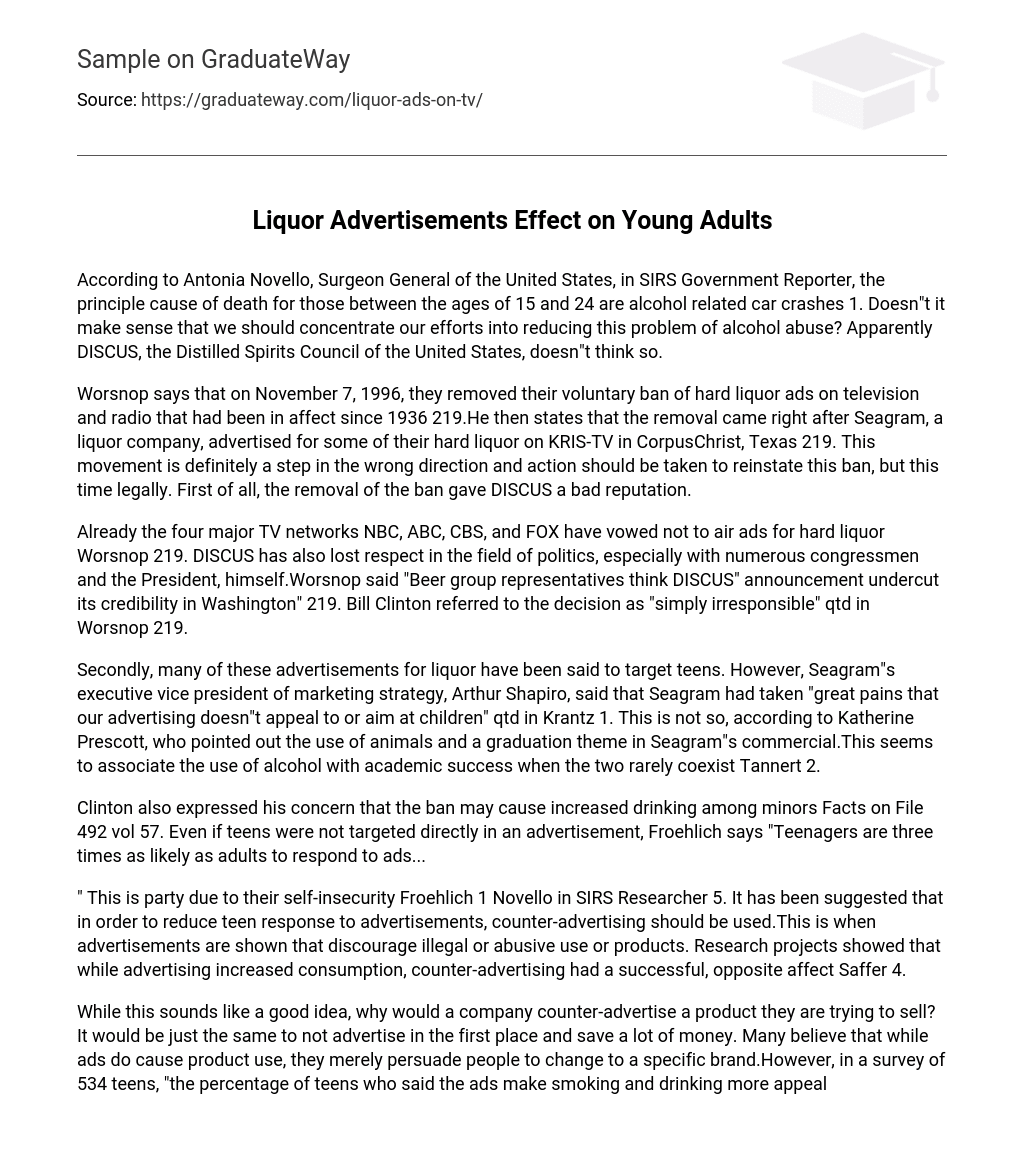Alcohol-related car crashes are the main cause of death for individuals aged 15 to 24, according to Antonia Novello, Surgeon General of the United States. Hence, it is vital to prioritize efforts in reducing alcohol abuse. Nevertheless, DISCUS (the Distilled Spirits Council of the United States) seems to hold a different viewpoint.
According to Worsnop, the voluntary ban on hard liquor ads on television and radio that had been in effect since 1936 was lifted in 1996. This decision was made following Seagram’s advertisement of their hard liquor on KRIS-TV in Corpus Christi, Texas. Worsnop believes this change is undesirable and suggests taking legal measures to reinstate the ban. Consequently, DISCUS has gained a negative reputation.
Currently, the four major TV networks, namely NBC, ABC, CBS, and FOX, have made a pledge to refrain from broadcasting advertisements for hard liquor (Worsnop 219). DISCUS has faced a loss of reputation in the political realm as well, especially among various congressmen and even the President himself. According to Worsnop (219), representatives of the beer group believe that DISCUS’ announcement has weakened its credibility in Washington. Former President Bill Clinton criticized this decision, referring to it as “simply irresponsible” (qtd in Worsnop 219).
Secondly, there have been claims that a lot of these liquor advertisements are aimed at teenagers. However, Arthur Shapiro, Seagram’s executive vice president of marketing strategy, stated that Seagram has made a conscious effort to ensure that their advertising does not attract or target young children (Krantz 1). However, Katherine Prescott disagrees and highlights the use of animals and a graduation theme in Seagram’s commercial. She believes that this links alcohol consumption with academic achievement, even though the two are seldom related (Tannert 2).
Clinton expressed concern about the ban potentially leading to increased drinking among minors. According to Froehlich, even if teens were not the primary target of advertisements, they are three times more likely than adults to respond to ads…
According to Froehlich 1 Novello in SIRS Researcher 5, teens may respond to advertisements due to their self-insecurity. To mitigate this, it has been proposed to use counter-advertising. This involves displaying advertisements that discourage the illegal or abusive use of products. Saffer 4 found that research projects demonstrated a successful opposite effect, as counter-advertising decreased consumption despite advertising increasing it.
Despite the potential benefits, it is questionable why a company would choose to counter-advertise a product they are actively trying to sell. It would seem more logical for them to refrain from advertising altogether and save significant amounts of money. Many individuals argue that although advertisements do influence product usage, their main effect is persuading people to switch to a particular brand.
However, according to a survey conducted on 534 teenagers, the percentage of teens who stated that ads make smoking and drinking more appealing exceeded those who claimed that ads make them want the product. Moreover, in regards to alcohol consumption, the survey revealed that 16% of 8th graders, 25% of 10th graders, and 30% of 12th graders had consumed at least five drinks consecutively within the two weeks preceding the survey (Horovitz and Wells 3-5).
According to Horovitz and Wells (3), young adults and teenagers are aware that they are the main target of beer and liquor ads. Krantz (1), a supporter of distilled spirits, argues that the industry should be treated equally to beer and wine because “alcohol is alcohol.” However, it is important to recognize that different alcoholic beverages have different alcohol content, with liquors generally having higher concentrations compared to beers and wines.
Distilled spirits companies are unhappy with the decline in their business as they are unable to advertise, unlike beer and wine companies. Beer sales have almost doubled since the 1960s, while liquor sales have decreased by 29% since 1980. While the advertising restriction has negatively affected the distilled spirits industry, it is not advisable for them to compromise their ethical standards to match those of beer and wine companies. Instead of lifting their own ban and using the beer and wine industry as a justification, DISCUS should advocate for a ban on advertising for both wine and beer to ensure fairness in the market.
This would allow the three industries to save costs by avoiding competition in the advertising sector. It is now necessary to change direction and proceed in the correct path. DISCUS should stop their irresponsible conduct and reinstate their voluntary ban to prevent legal action and potential embarrassment.
We must pay attention to and care about the types of advertisements that appear on television. As Norman Douglas once stated, “You can discern a nation’s ideals through its advertisements” 724.





